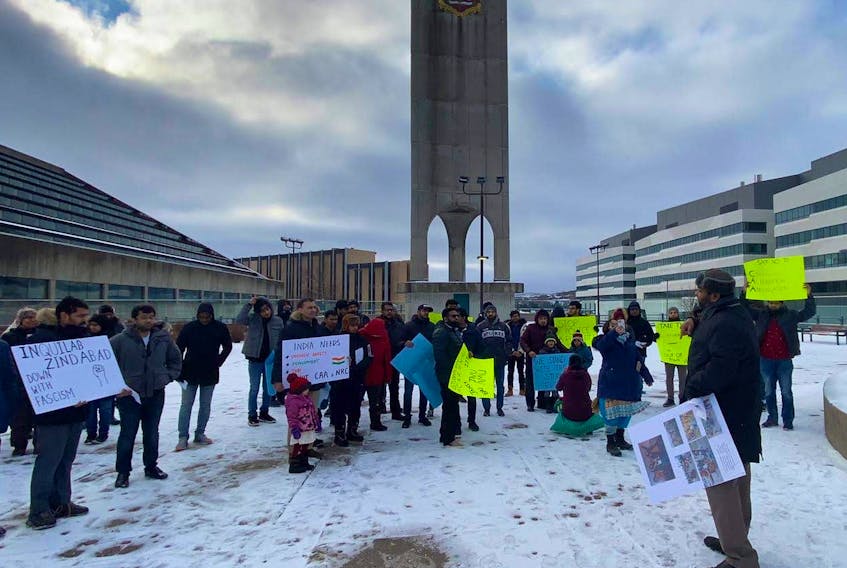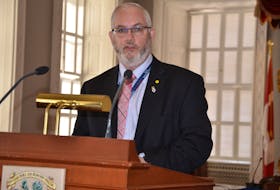India is complex. For eons, the subcontinent has been a coveted prize, eagerly and greedily sought by empires small and big. The region has seen a seismic shift over time, gradually turning into an intricate concoction of variegated languages, foods, cultures and religions.
A tidal change arrived in 1947 when the hands of the British Raj tore open India’s guts, splitting it into pieces, leaving wounds so deep that even time seemed to be clueless on how to heal them.
Today, the subcontinent is again in waters filled with fury. The heat can be felt across seven seas right to the eastern-most city of North America, St. John’s.
Close to the holidays, a protest in St. John’s saw several South Asians — young and old —gather to voice their concerns over the Citizenship (Amendment) Act (CAA) and National Register of Citizens (NRC).

“We gathered to show solidarity to students across India, across various universities in India, to support that we are with them in this difficult hour,” said Faisal Fahd, executive member of Muslim Student Association (Memorial University), and a PhD student in Environmental Engineering from Vijaywada, India.
MSA organized this protest right before Christmas to convey its support to the student population in India on whom Faisal said excessive force and brutality was used as they held peaceful demonstrations against CAA and NRC.
CAA and NRC: More than a string of few letters
CAA and NRC are more than simple acronyms. These combinations of letters are life-altering for many, inside and outside India.
Mohammad Asif is one such individual. From Azamgadh, Uttar Pradesh, he has called St. John’s home for a year arriving to pursue his PhD in Process Engineering.
Speaking candidly about the direct impact of the new changes on a Muslim Indian, such as himself, and the importance of a protest miles away from home, he said, “We came here as a student. Ultimately, we will be affected … We don’t want to prove our citizenship again and again.”
The incumbent government, its actions in Assam and the lack of a cohesive plan on effectively implementing the CAA and NRC are concerning matters for Asif. Protests continue to roil the nation weeks after the bill was passed in parliament with a constant stream of reports of illegal detention, arrests on false charges, violence by authority on peaceful protesters including arson and looting.
But not everyone within the South Asian community in and outside St. John’s is against the act.

The price for having a voice
Arya Kumar (not their real name) is a Canadian citizen born in Bangladesh and educated in India. Their identity has been concealed due to safety concerns for their family members living in the subcontinent."
Arya was a teenager when they were left with no other choice but to flee persecution in Bangladesh.
Moving base to India, fleeing the harassment, implied starting afresh and contributing to the social, cultural and economic fabric of India. So, for Arya, it was with much happiness that they greeted CAA as it provides, individuals like them, an opportunity to formally and legally attach their identity to India, with wait-times reduced to 5 years instead of 11.
Their vocal stance on this topic, however, has cost them friendships.
“My Muslim friends in Bangladesh, I cannot name even one who isn’t happy for me….I don’t understand why my other Muslim friends [outside Bangladesh] have a problem with this. That hurts me,” said Arya.
Elaborating, Arya said, “Even if I keep the politics aside, if I get it [Indian citizenship], why not [be happy for me]? I didn’t have any other place to go and seek refuge. All my Bangladeshi friends support this. But all my Bangladeshi Canadian friends are not supportive.”
The amended legislation applies to individuals who were “forced or compelled to seek shelter in India due to persecution on the ground of religion” fast-tracking the citizenship process for Hindus, Christians, Sikhs, Buddhists, Parsis and Jains who have come from Pakistan, Bangladesh and Afghanistan by Dec. 31, 2014.
While CAA clearly fulfils a need for individuals such as Arya, a closer look reveals that CAA doesn’t protect all religious minorities nor does it apply to all neighbours leaving out Rohingyas (Myanmar), Hazaras (Afghanistan), Nepalese Muslims and Uyghurs (China). Speeding up citizenship for non-Muslim migrants seeking refuge in India has reignited communal tension within and outside India.
Political discourse and pain: Two peas in a pod?
Approximately 50 people of varying South Asian ethnic roots and religions, attended the protest to voice their concerns against this very discrimination that ringfences Muslims identity in secular India. With this protest being the second in a span of four months, it has left a profound impact on the small community of South Asians in the region.
Rubin Deol, after acquiring an MBA from University of Toronto, moved to St. John’s for the idyllic, quiet life the city is known for, far from the communal politics present in bigger Canadian centres. He is disappointed with the ostensible and intangible divide that has been created within the community and linked it to vote bank politics.
“There are a few people in the community who want to become leaders of that vote bank, right? … Those are the people who are using the university students to get that vote bank …” said Rubin.
He said that he has seen the ease with which people from the South Asian community have been divided based on religion for political mobilization with university students being used as a medium. Friendships, built with love and respect, amongst South Asian families have gone kaput because of the political discourse that has ensued over the past few months in the city.
Regardless of the religious denomination what is as evident, as a night of a cloudless sky, is the pain felt within the community. The turmoil oozing out of India’s borders, reaching the waters of Canada through the waves of social media, depict how much borders have shrunk.
Though the arms of unrest reach far beyond simple, man-made, geographic boundaries, impacting lives and relationships thousands of kilometres away, Faisal hasn’t lost hope or faith. It shone through his eyes when he said, “...If push comes to shove, my strong conviction is that people will show the love and compassion when the situation comes.”
India is complex. Always has been and, perhaps, always will be.
Prajwala Dixit is an Indian-Canadian engineer, journalist and writer in St. John’s, N.L who writes a biweekly regional column for the SaltWire Network. When she isn't engineering ways to save the world, she can be found running behind her toddler, writing and volunteering. Follow her and reach her at @DixitPrajwala
MORE FROM PRAJWALLA DIXIT









